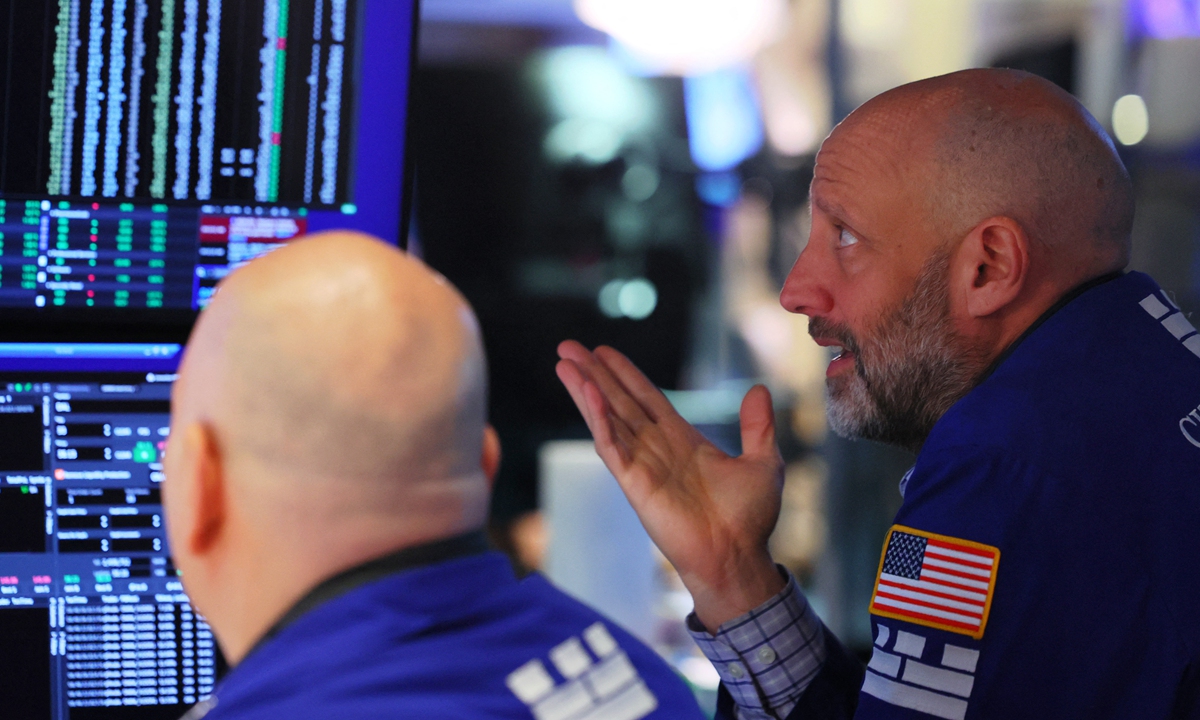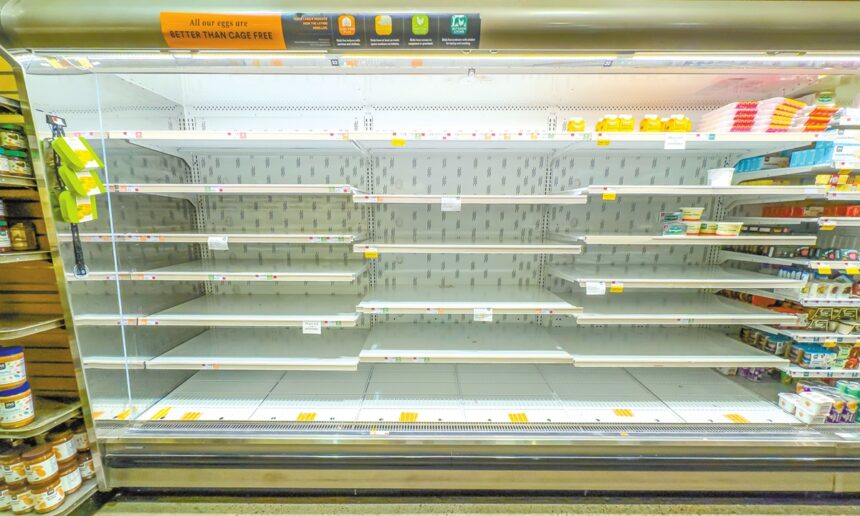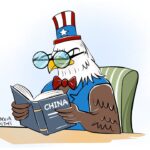By Lin Xiaoyi and Huang Lanlan
“Though we are unaware of how bad it could get, we are holding our breath for what could come from it.” In the heart of Muscatine, Iowa, 21-year-old Katharina Scholze, a full-time nanny, captures the growing unease that has gripped American consumers.
“The price of eggs, seafood, sugar, beef and pork have gone up. People have also been talking about how we need to start buying more non-perishable foods such as canned foods and rice just in case. Prices have started to go up and unfortunately will continue to rise,” Scholze told the Global Times.
Recently, the phrase “the most expensive dish is scrambled eggs in the US” has gone viral on the internet, encapsulating the absurdity of the current “egg crisis” sweeping the nation, driven by avian influenza and dwindling supplies. Yet, this crisis is merely the tip of the iceberg.
As the new US government has slapped “reciprocal” tariffs on about 90 trading partners, and some affected countries and regions including China have announced to hit back with retaliatory tariffs, concerns over the rise in the price of almost everything around – not only eggs – are growing among US residents.
Things got more complicated on Wednesday afternoon local time, when US President Donald Trump posted on Truth Social that new tariff policies would be suspended for 90 days for “more than 75 countries,” but raised the tariff charged to China to 125 percent, and “effective immediately.”
The erratic and frequently changing tariff policies have further intensified US consumers’ concerns about the future. Many people in the country have reportedly flooded the markets to stockpile more goods apart from eggs, from daily consumable like flour, canned goods, toilet paper and beverages, to electronics.
Although White House press secretary Karoline Leavitt said the tariffs are a “golden rule for the golden age,” that “won’t lead to ‘pain’ for US workers or American-owned businesses,” empty food shelves at some supermarkets and a flood of complaints on TV programs and social media platforms have shown that many Americans are not buying the narrative.
“Rising prices as well as unease about the economic situation definitely plays a big role in how we are going to handle this unprecedented situation.” Faced with the fact that many people around her are engaging in frantic stockpiling due to concerns that a new round of large-scale tariffs from the US government will cause prices to soar, Scholze said she personally hasn’t participated in panic buying yet, but it’s always in the back of her mind.
‘The most expensive dish is scrambled eggs in US’
“There it is the beautiful, precious 12 eggs.” This is the opening of a video clip sent by Amy Chou, a housewife living in Brooklyn, to the Global Times before her interview.
In the video posted on RedNote, user “Mancho Soto” described that there is currently an egg shortage in America, and the supermarket only allows him to purchase one dozen eggs at a time, which is the only success he had after visiting different supermarkets over the course of two days.
Amy shared with the Global Times that each trip to Costco to grab eggs has become one of her most anxious moments since March. “I set the alarm for 6 am, and the whole family goes out. I handle the parking while the others rush in,” the housewife said. Behind Amy’s family’s organized egg-buying spree is the fact that the price of a dozen eggs has skyrocketed from $3.50 to $12.
“The price increase at Costco is still relatively reasonable, which is why people rush to buy them. Supermarkets have no choice but to impose purchase limits,” she noted.
“We know that the egg shortage in the US is directly caused by avian influenza, but as you pay more attention to this issue, you realize that it’s not that simple.” In Amy’s view, the prolonged predicament faced by Americans over eggs is a “self-inflicted” consequence of US tariff policies.
“The so-called ‘reciprocal’ tariff policies in the US have tied its own hands and feet, leaving them helpless in the face of rising egg prices,” she said.
The US Department of Agriculture predicted a further 57 percent increase in egg prices this year, according to an article published by a financial advisor service site Mi Bolsillo Colombia on MSN on Monday. It said that wholesale prices [of eggs] have decreased recently but remain 60 percent higher than last year, averaging $3 per dozen. “The tariff plan could exacerbate these price pressures, complicating efforts to stabilize the market,” it said.
The “egg crisis” seems to be getting worse as many countries have refused to export eggs to the US. A March 28 article by CBS said the US Department of Agriculture had approached countries including Germany, Italy, Poland and Sweden to address the egg shortage, “but so far comes up empty-handed.”
On Facebook, many users have shared similar images of a man proposing to a woman on one knee, holding a box of eggs. The captions read, “Impress her with something expensive,” and the humor is amplified by the woman’s surprised smile in the pictures.

A meme picture that netizens share on Facebook to tease the soaring egg price in the US Photo: screenshot from FacebookOn X, a user worried about the upcoming Easter. “How our wallets about to be when buying eggs for Easter,” he wrote, attaching a meme of a man sighing at his empty wallet. “…fix this and the stock market crash…we got no money!”
“During last year’s presidential elections, we placed our hopes in the new administration to tackle the escalating issue of inflation. However, it has become increasingly apparent that the US, often touted as the strongest nation in the world, struggles to address something as fundamental as the rising cost of eggs in a timely manner,” Amy told the Global Times.
While some online discussions have emerged regarding the US government’s latest announcement of a 90-day pause on tariffs for countries affected by higher US tariffs – potentially facilitating smoother egg imports – Amy still expressed deep concerns.
Distrust and anxiety toward the government have become deeply ingrained in the American psyche, she said.
Higher tariff, heavier burden
“We have already been grappling with rising prices across the economy since the pandemic, and now, with the looming tariffs, there’s a palpable sense of anxiety and uncertainty,” Scholze said. “We don’t really know exactly how extensive the effect will be on the average American.”
Scholze cited a quote from a recent New York Times article that has been echoing in her mind: “Grocery shoppers are likely to feel the impact of the Trump administration’s sweeping new tariffs before April is over. And the first place they’ll feel it is in parts of the store where the inventory has to move fast.”
“Most of my skincare products are imported, and I eat a lot of fruits and vegetables, along with coffee every single day, so those will be affected as well. Additionally, electronic devices like smartphones and laptops are also manufactured overseas, so their prices will likely skyrocket too,” Scholze said, noting that these tariff policies are already creeping into her household budget.
“Tariffs inevitably get passed down to us consumers, this then drive up the prices of everything,” Scholze said, noting she doesn’t want to think about it, as Americans have already started to see prices rise more.
“We will focus more on delaying big purchases and buying less non-essential items or cheaper alternatives. Few people will be able to afford to go on vacation, or go to concerts, because the daily cost of living will rise greatly.”
Scholze also noted the recent volatility in the stock market, which has been reacting sharply to the rapid announcements of tariff changes. “I’ve heard that it’s impacting people’s retirement accounts as well,” she said. “What we’re likely to witness in the near future is how these drastic tariff policies will backfire, rather than boost the American economy.”

Traders work on the New York Stock Exchange during morning trading on April 8, 2025 in New York City. Photo: AFPIn the past two weeks, Amy’s husband, an engineer at Amazon, has seen his investments take a significant hit, losing around $30,000, about 20 percent of their value. His retirement fund has also dropped by $50,000, a staggering 20 percent decline. “Although my husband is still holding onto his stocks, believing the market will eventually bounce back, we are seriously considering setting up a contingency fund,” Amy said.
Clearly, US’ tariff measures are equally harming the general population back in the country. “Tariffs are a tax paid by the US importer that will be passed along to the end consumer,” said David French, executive vice president of government relations at US National Retail Federation, in an April 7 statement regarding the government’s announcement to impose “reciprocal” tariffs. “More tariffs equal more anxiety and uncertainty for American businesses and consumers. While leaders in Washington may not care about higher prices, hardworking American families do.”
Great uncertainty
If the “egg crisis” serves as a sharp, short-term blow to consumer confidence, the deeper, chronic pain felt by the American public appears to stem from the government’s erratic economic and trade policies aimed at maintaining hegemony.
Minutes from the US Federal Reserve’s March session, released on Wednesday, showed that Federal policymakers were finding it difficult to curb inflation and promote growth, said an article published on website of Columbia Business School that day.
“Participants assessed that uncertainty around the economic outlook had increased, with almost all participants viewing risks to inflation as tilted to the upside and risks to employment as tilted to the downside,” the minutes stated.
Amid significant uncertainty, some companies are increasingly inclined to remain in China to avoid being adversely affected by the frequently changing policies of the US government.
In a Wednesday story by The New York Times, titled “In a storm of tariffs, many companies see China as the safest harbor,” an international contract manufacturer said it was impossible to make any long-term decisions about shifting outside China based on what feels like haphazard decision-making from the US. “The rules of the game seem to change every day. It feels we have no option but to sit tight,” the executive said on anonymity.
While “economists don’t agree on much… almost every economist agrees that high tariffs are terrible economic policy,” said Laura Veldkamp, a professor in finance and economics at Columbia Business School, according to an article on the school’s website.
This “terrible economic policy” are continuing to hurt more back in the US as the new tariffs on China would rise. “Our figures corroborate the White House’s numbers, and show that over half of the expected $2 billion in daily tariffs will come from duties levied on Chinese imports, a tax US importers will be responsible for paying immediately,” CNBC cited William George, director of research for ImportGenius, in a Wednesday story.
“When US government attempts to assert the country’s dominance by coming up with aggressive policies like tariffs to ‘win’ a trade war, it’s not the politicians who are getting hurt, it is the ordinary American people,” Scholze said.
Amy said that many people in her community are paying attention to the new refund-upon-purchase policy announced by China on Tuesday, which allows foreign visitors to instantly claim value-added rebates at tax-free stores.
“There’s growing enthusiasm about visiting China for tourism, with shopping becoming a more compelling part of their travel plans,” she said.














